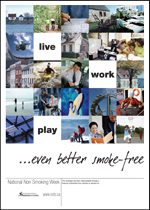BETTER tools help patients take action for healthier lives – including quitting smoking
January 21, 2013

National Non-Smoking Week, Jan. 20-26, encourages Canadians to “Live, work, play … even better smoke free” and the Partnership-funded BETTER Project is helping practitioners help their patients to do just that.
Shelley Bible helps people stop, or reduce, their smoking through her work at Edmonton’s Grey Nuns Family Medicine Centre. Lately she’s had new tools to help with the challenge — thanks to the BETTER Project.
The project, part of the Partnership’s Coalitions Linking Action and Science for Prevention initiative, has integrated the best evidence about smoking, physical activity, alcohol and nutrition to create a toolkit of primary care practice resources to help prevent cancer and related diseases such as diabetes and heart disease.
It all begins with a very detailed patient questionnaire.
“After they’ve done the questionnaire they are a lot more aware of their habits,” says Bible, a registered nurse who’s been trained as BETTER Prevention Practitioner. “By the time they meet with me they seem more ready to consider changes and are some are saying “It’s time. Maybe I can do something about my health.””
Prevention prescription
Before she meets with patients, Bible reviews their BETTER questionnaire and electronic health record. Together they examine key areas, such as blood pressure or cholesterol levels, and whether the patient is up-to-date with recommended screening tests (e.g., colorectal cancer screening). After discussing lifestyle factors — including smoking, alcohol, diet and exercise — they develop a “prevention prescription” with resources, referrals and timelines.
“It’s a chance to do more one-on-one teaching especially using my motivational interview skills. Smokers usually know about lung cancer, but they know very little about how much smoking affects their heart and other important organs in their body. They start to see the interaction with smoking and cancer, smoking and diabetes and smoking with heart disease.”
Pilot project success
Bible’s family health centre is one of four in Alberta, along with four in Ontario, that participated in the BETTER project and evaluation. Tracking of almost 800 participants showed the approach demonstrated positive changes in health behaviours related to cancer prevention and increased uptake of screening.
The program, which is not limited to patients who smoke, also included evidence-based tools to help practitioners improve their overall approach to prevention and screening and optimize their use of electronic health records.
Program expanding to three more provinces
Deb Keen, the Partnership’s Director of Prevention and Research, says the BETTER Project is a good example of how the Partnership supports cancer prevention and screening.
“Helping people develop good health habits, including reducing smoking, is vital to major gains in cancer control. We know how important it is to support family practitioners in these efforts,” says Keen. “The BETTER Project enabled the development and testing of new evidence-based tools for a challenging problem.”
After a rigorous external review of what was accomplished in Alberta and Ontario, renewal funding was awarded to expand the BETTER Project to new jurisdictions. The prevention and screening tool will be available in Nova Scotia, while the project will be adapted for implementation in remote and rural communities in the Northwest Territories and Newfoundland and Labrador.
Beyond BETTER
The Partnership is pleased to support the awareness activities of the Canadian Council for Tobacco Control’s National Non-Smoking Week and to spotlight evidence-based resource centres created by others such as those of the Smoking Cessation Knowledge Exchange Network.
In addition, the Partnership’s Prevention Policies Directory, available through Cancerview.ca, is helping enable smoking-related policy initiatives. The Directory brings together cancer and chronic disease prevention policies from hundreds of Canadian sources in a searchable online tool. It was created to support public health professionals, academic researchers, and policy specialists as they work to create healthier communities through policy change, for example by developing policies that limit exposure to second-hand smoke in public places.
Lung cancer, largely caused by smoking, is the leading cause of cancer death in Canada for both men and women, with an average of 55 people dying from it each day.[1]
CLASP call for proposals
The Coalitions Linking Action and Science for Prevention (CLASP) initiative that funds BETTER is inviting proposals for new projects. For more information on the process for CLASP2 applications and key dates leading up to the March 21, 2013 deadline for submissions, please see the open competitive bids page, under Procurement.
Notes
1 http://www.cancer.ca/en/cancer-information/cancer-type/lung/statistics.
